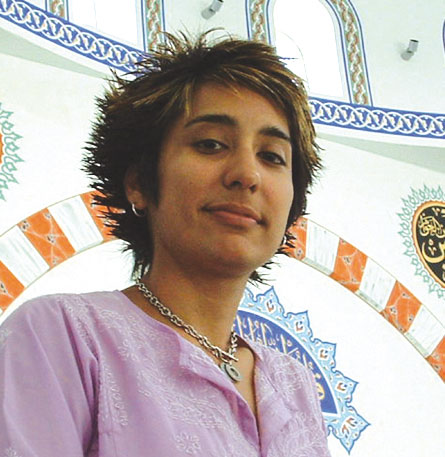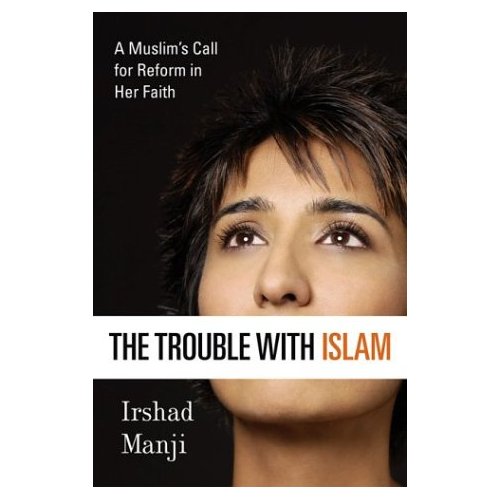She fully understands that history is made by those in power. She consistently opposes those who don’t defer to power.

At the University of Illinois at Chicago on Feb. 13, Muslim lesbian Irshad Manji delivered the ideas for which she’s well known and criticized: Muslims are mindless drones who perpetuate Islam’s most repressive aspects, like homophobia and sexism; the way out of this “asylum logic” is to revive “ijtihad,” a “lost” tradition of Islamic critical thinking and resistance; and reviving this tradition is best done through her Web site (Muslim-refusenik.com). Her speech was replete with binaries, including “the West” against “Islam,” good Muslims (like Manji) against bad Muslims (fundamentalists who can’t stand her). I was reminded of what Manji had described as a “kerfuffle” between the UIC Office of Gay, Lesbian, Bisexual, and Transgender Concerns (OGLBTC, a sponsor of the event) and UIC’s Muslim Student Association (MSA). The MSA had supposedly attempted to shut down the event. Curious, I interviewed Dr. Patrick Finnessy, the director of OGLBTC, and Mohammed Hussain, the student president of the MSA.
Finnessy had tried to get in touch with the MSA over previous months to see if it would co-sponsor the event. Eventually, the MSA wrote a letter to the chancellor a few days before Feb. 13, stating its objection to the university inviting Manji. Meanwhile, Hussain, hearing of possible protests, sent out a mass e-mail asking MSA members to respect Manji’s right to freedom of speech and not disrupt the event.
Rumors about the MSA’s objections subtly reaffirmed Manji’s assertions: that Muslims who oppose her emerge from a primordial swamp, oozing the bigotry and hatred that Islam has taught them. A different picture emerged when Hussain told me what students’ objections had been: Manji was no scholar of Islam; her presence offered no possibility of dialogue; progressive Muslims disagreed with her; and she was wrong to think that lesbianism was incompatible with Islam. Why did it take the MSA so long to decide what to do? Hussain said the lack of any unified Muslim voice of opposition to Manji, and the ensuing internal debates and discussions, made it difficult to decide until the last minute.
Both Finnessy and Hussain demonstrated exemplary leadership, and their organizations are now collaborating on bringing in speakers for the fall. It might seem that Manji’s presence on campus brought them together in an unprecedented way; that’s certainly the impression she sought to convey. That assumption only perpetuates the notion that Manji’s presence inevitably brings together opposing forces into dialogue where there had been none. It makes the MSA’s internal debate and dialogue invisible. Regardless of whether they objected to her on progressive grounds or not, the fact is they acted upon their right to dissent from her, and adopted official University channels to do so.
For more perspective on a progressive Muslim critique of Manji, I interviewed two academics: Saadia Toor, at the College of Staten Island of the City University of New York; and Daniel Drennan, at the American University of Beirut, who also runs the Web site Inquisitor.com. Both are troubled by Manji’s depiction of a universal Islam. As Toor put it, there are few commonalities between the billion adherents of Islam. She refutes Manji’s notion that there has been no dissent against fundamentalist Islam. Toor was 8 in 1978 when the Pakistani dictator Muhammad Zia Ul-Haq came to power; her formative years were influenced by women in progressive feminist groups like the Women’s Action Forum, among Ul-Haq’s loudest critics. Toor finds that Manji’s binaries make it difficult for progressive Muslims to articulate nuanced critiques of Islamophobia. Or, as Drennan wrote in an e-mail, they “[ frame ] the question in such a way tactically to put the ‘other side’ always on the defensive, such that we never get to any true discussion.”
Manji’s critics take issue with what they see as her extreme pro-Israel stance and her approval of U.S.-led invasions in Afghanistan and Iraq. While she professes pain at such criticisms, Manji continues to write New York Timesop-eds like “How I learned to Love the Wall.” Here, she acknowledges that Israel’s barrier might be painful for Palestinians, but notes approvingly that the Israeli army is kind enough to let people slip (dangerously and uncomfortably) through holes and gaps.
Such leaps in logic cause her critics to highlight Manji’s blindness to historical realities. But Manji is, in fact, not blind to history. She fully understands that history is made by those in power. She consistently opposes those who don’t defer to power. In The Trouble with Islam Today, she writes about a three-hour visit to the Jimmy Carter Center in Atlanta. Shocked to find no African Americans there, she goes to the Martin Luther King memorial. It’s filled with African Americans.
 She demands to know why these “privileged victims” aren’t at the Carter Center to honor a man “who made civil rights the cornerstone of his domestic agenda” (failing to note that African Americans had something to do with said agenda) . A terse response—“Why should we waste our time at the shrine of a white man?”—leads her to conclude that African Americans are at the MLK memorial to “strut [their] ‘free-at-last’ swag.” She doesn’t, of course, ask the white people at the Carter Center why they aren’t at the MLK memorial.
She demands to know why these “privileged victims” aren’t at the Carter Center to honor a man “who made civil rights the cornerstone of his domestic agenda” (failing to note that African Americans had something to do with said agenda) . A terse response—“Why should we waste our time at the shrine of a white man?”—leads her to conclude that African Americans are at the MLK memorial to “strut [their] ‘free-at-last’ swag.” She doesn’t, of course, ask the white people at the Carter Center why they aren’t at the MLK memorial.
Back at UIC, I watched Manji as she continually exhorted people to visit her Web site. I realized that, in effect, she’s selling something akin to a 12-step program: Just click for freedom from repressive Islam. She spoke of a young UK jihadi who has seen the error of his ways through her—and who will be featured in an upcoming 60 Minutes episode. Such individualized stories, cast in the media drama of the West vs. Islam, deny the forms of collective dissent that occur within groups like the MSA where competing opinions are aired. And despite her purported concern with gender, Manji makes no mention of groups like RAWA (Revolutionary Association of the Women in Afghanistan, Rawa.org/index.php), whose resistance to the Taliban included setting up underground schools for girls.
Manji’s identities—lesbian, feminist, Islamic—allow some liberals and queers to echo an otherwise politically incorrect disdain for Islam while assured that she’s one of them. And without needing to understand the complicated histories of resistance and dissent that occur outside of her media box. Struggles like those of RAWA occur silently at the dangerous crossfire between Western-led dominance and fundamentalist Islam. In 2003, Manji’s message about Islam vs. the West was more attractive to some. Today, she finds herself slipping towards the wrong side of history and tries to have it both ways. In The Trouble with Islam Today, she praises Bush and entitles a chapter “Thank God for the West,” but at UIC joked about evangelicals in the White House. Few seemed impressed, and one non-Muslim queer student described her as “bland.” On her Web site, Manji still offers the sexy spectacle of commodified dissent. The question is: Who’s watching?